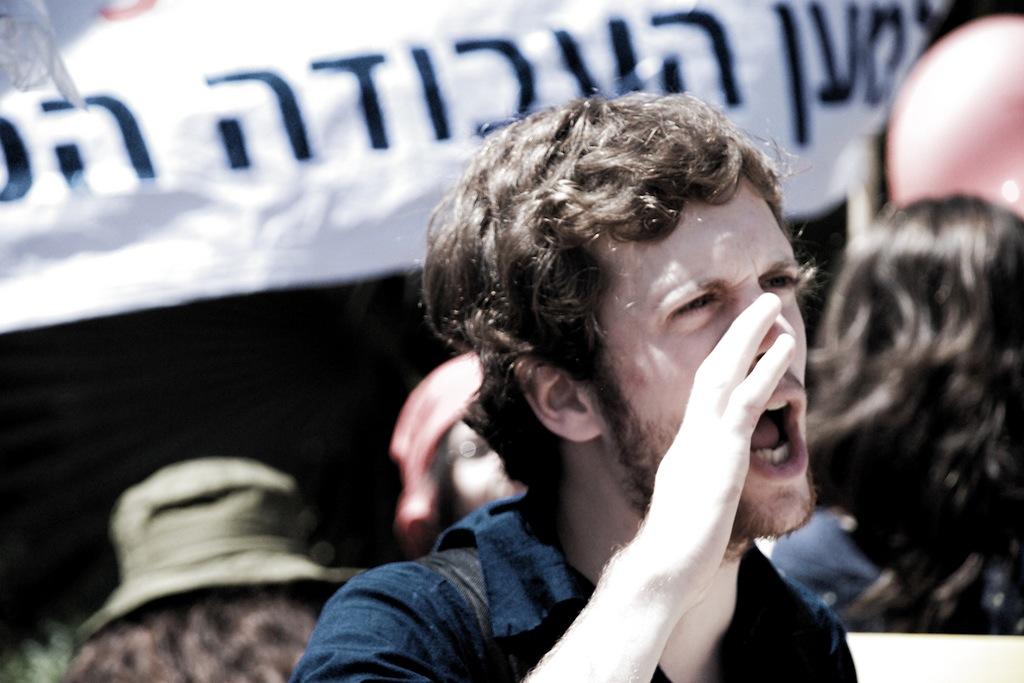What do Israelis have to protest on May Day?
Minimum wage in Israel is down compared to living expenses, and many workers are unable to provide for their families.
Israelis took to the streets of Tel Aviv today to protest changes in Israel that are eroding the socialist fabric on which the state was founded.
“We are struggling for the same the things that they were struggling for 150 years ago,” says Alon-Lee Green, an organizer of today’s demonstration and a member of the Communist Party of Israel. “It’s like we are going back in time to the nineteenth century.”
Workers in Israel are actually seeing a decline in rights and relative wages says Green. It was low wages paired with rising prices that inspired a young Israeli woman, Daphne Leef, to pitch her tent on Tel Aviv’s Rothschild Boulevard last summer. She soon made a Facebook group and within hours, more tents popped up on the Boulevard and for weeks the tent city occupied central Tel Aviv.
As many 350,000 Israelis took part in a mass march in first week of August 2011, and a key compliant was the cost of living in Israel. Housing and food prices are comparable to the US — gas is almost twice as expensive here — but wages are low. Minimum wage is just over $1,000 per month and many Israelis who work full-time are not able to cover basic living costs. And as the Israeli economy grows, fueled by an advanced tech industry, the gap between rich and poor widens.
“It’s not poverty in the worst way,” admits Green, “but we have a very wide gap between the 1 percent of the population and other 99 percent.”
Three decades ago, Israel was poorer as a whole but Socialist values were stronger. Since the late 1980s, the country has undergone a wave of privatization.
“Israel is going the opposite way, with the privatization of every public company—oil, electric and now the train,” says Green. He says this has a negative impact on the rights of workers.
In March, the transport minister announced that Israel would also privatize the national railway after negotiations with the railway’s labor union failed. This means, claims Green, further eroding workers’ rights and deceasing safety standards for passengers, as maintenance will be passed over to contract workers.
While this is not the usual leftist protest against war and occupation, Green says it’s connected and ending the occupation of the Palestinian Territories is key to living in security and prosperity. He says the budget now used for the military could be diverted to Israel’s under-funded education system and fading welfare structure.
Israel spends billions of dollars each year on its military and indirectly subsidizes Israeli settlements in the occupied West Bank. Living in one of these settlements is cheaper than many urban centers inside Israel’s borders.
“We are demanding an end to the occupation because we understand the only way to be a prosperous country is to support our citizens,” says Green. “And equality for all. And that means no discrimination of women at work, Arab’s in society or migrant workers in Israel.”
In many ways last year’s protests raised awareness here about labor and economic issues. Long distracted by concerns of security, labor rights seemed a frivolous concern to many Israeli’s who believe the very existence of their state is threatened.
And this awareness means more organizations are joining today’s protest. Usually around 40 labor-focused groups join Israel’s May Day demonstrations, but this year that number is over 80.
“Normally it’s just the usual suspects like Communist Party and workers’ unions,” says Green. “This year it’s much wider. We have lot of environment organizations, young and students activists and even the journalists union.”
For more on workers' rights around the world, read GlobalPost's Special Report, "Worked Over: The Global Decline of Labor Rights."
We want to hear your feedback so we can keep improving our website, theworld.org. Please fill out this quick survey and let us know your thoughts (your answers will be anonymous). Thanks for your time!
